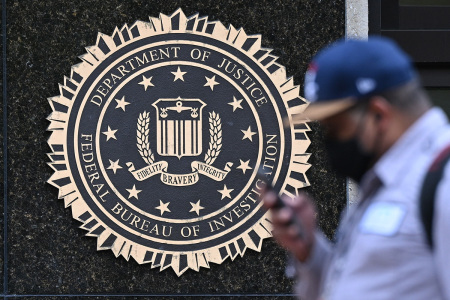FBI director subpoenaed over memo warning of 'radical-traditionalist Catholic' threat

The U.S. House of Representatives Judiciary Committee has issued a subpoena to FBI Director Christopher Wray as the federal law enforcement agency continues to face criticism over a rescinded memo suggesting that "radical-traditionalist Catholic ideology" constitutes a potential national security threat.
In a letter published Monday, House Judiciary Committee Chairman Rep. Jim Jordan, R-Ohio, subpoenaed Wray to produce documents related to a document produced by FBI's Richmond, Virginia, field office outlining the threat posed by "radical-traditionalist Catholic ideology."
The leaked document, which has since been rescinded, made headlines in February as it cited the Southern Poverty Law Center, a far-left activist group that categorizes conservative organizations with different views on abortion and marriage as "hate" groups.
Jordan contends that a subpoena is necessary in light of Wray's "disregard of [the committee's] earlier requests" for relevant material.
While Jordan acknowledged that the organization responded to his committee's requests with 18 pages of documents on March 23, he described the response as "substandard."
He said the FBI's response featured "significant redactions of 'personally identifiable information' or 'specific non-public information about [FBI] investigations, sources, and methods' that prevents the Committee from fully assessing the content and context of the documents and obtaining information requested from the Bureau."
Jordan highlighted concerning findings from the small batch of documents provided by the FBI, including an effort to "use local religious organizations as 'new avenues for tripwire and source development.'"
Additionally, the FBI's Richmond field office suggested that an undercover employee "engage in outreach to the leadership of the [Society of Saint Pius X] to sensitize these congregations to the warning signs of radicalization and to enlist their assistance to serve as suspicious activity tripwires."
Part of this outreach plan involved reaching out to "mainline Catholic parishes" and the local "diocesan leadership" for assistance. The revelations exposed by the documents did not sit well with Jordan.
"This information is outrageous and only reinforces the Committee's need for all FBI material responsive to our request," he wrote. "The documents produced to date show how the FBI sought to enlist Catholic houses of worship as potential sources to monitor and to report on their parishioners."
Noting that "Americans attend church to worship and congregate for their personal and spiritual betterment," Jordan proclaimed, "they must be free to exercise their fundamental First Amendment rights without worrying that the FBI may have planted so called 'tripwire' sources or other informants in their houses of worship."
In the Jan. 23 memo, the FBI's Richmond field office warned that "the increasingly observed interest of racially or ethnically motivated violent extremists (RMVEs) in radical-traditionalist Catholic ideology almost certainly presents opportunities for threat mitigation through the exploration of new avenues for tripwire and source development."
The memo, which was rescinded amid pushback, identified adherents to "radical-traditionalist Catholic ideology" as those "typically characterized by the rejection of the Second Vatican Council (Vatican II) as a valid church council; disdain for most of the popes elected since Vatican II, particularly Pope Francis and Pope John Paul II; and frequent adherence to anti-Semitic, anti-immigrant, anti-LGBT, and white supremacist ideology."
Vatican II occurred from 1962-1965 and reformed "the liturgy, attitudes towards non-Christian religions, roles and responsibility of the laity, views on religious freedom, etc.," the memo described. The document attempted to distinguish "radical-traditionalist" Catholics from "'traditionalist Catholics' who prefer the Traditional Latin Mass and pre-Vatican II teachings and traditions."
At the same time, the memo warned that "RMVE interest in RTCs is likely to increase over the next 12 to 24 months in the run-up to the next general election cycle" and predicted that RMVEs and RTCs would find common cause on the issues of "abortion rights, immigration, affirmative action, and LGBTQ protections."
The document drew particular concern from lawmakers because of its reliance on the SPLC as a source.
In a Feb. 16 letter to Wray, Jordan and Rep. Mike Johnson, R-La., chairman of the Subcommittee on the Constitution and Limited Government, requested "all documents and communications referring or relating to intelligence products about 'racially or ethnically motivated violent extremists' and 'radical-traditionalist Catholics' for the period of January 20, 2021, to the present" as well as "all documents and communications referring or relating to the basis" for the Jan. 23 memo.
The lawmakers also sought to obtain "a list of the FBI investigations, local law enforcement agency reporting, and liaison reporting, with varying degrees of cooperation and access that the FBI's Richmond Field Office relied upon to make its assessments." The lawmakers also sought a list of employees involved in "drafting, reviewing, approving, or disseminating" the memo.
The limited response from the FBI, provided on March 23, came in response to a follow-up letter authored by Jordan on March 20.
Bill Donohue, president of the Catholic League for Religious and Civil Rights, sent a letter to Wray Tuesday asking the FBI Director to "make public those documents that are related to the FBI's outreach program to 'mainline Catholic parishes' and 'local diocesan leadership.'"
"This is taking the FBI into new, and disturbing territory. We know from previous disclosures that the FBI was probing 'Radical-Traditionalist Catholics' (RTCs). To this day, we have not seen any evidence that they are a threat to anyone," Donohue wrote.
"Now, the FBI has upped the ante," he added. "The First Amendment provides for a healthy measure of autonomy between church and state, so when the state encroaches on religious bodies, it had better have unambiguous and very serious reasons for doing so. I would like to know what they are in this instance."
Ryan Foley is a reporter for The Christian Post. He can be reached at: [email protected]






















